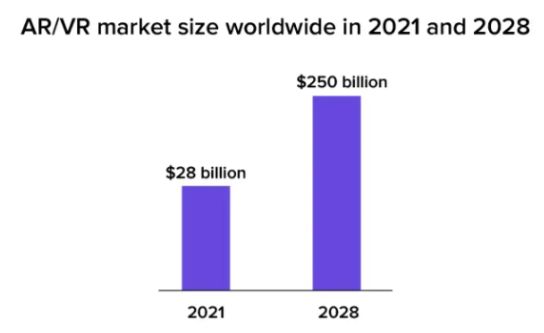Strategies for Merging Your Business with the Metaverse
In Brief
In the metaverse, major corporations are eager to tap into the lucrative opportunities the digital landscape offers.
Metaverse marketing represents a groundbreaking approach for brands to connect with their target audiences.
In this article, we will present case studies illustrating how various enterprises are flourishing in virtual environments.
The metaverse acts as an expansive virtual realm where individuals can engage, form relationships, and operate in a manner akin to their activities in the tangible world. The term gained traction following Facebook’s rebranding to Meta in October 2021, igniting discussions about its immense potential. The company has pledged a staggering $10 billion to create this digital universe and explore uncharted avenues.

Although the concept of a business metaverse is still in its infancy, the technology is poised to transform several sectors, including social media , eCommerce, and even real estate.
Presently, the global market for the metaverse is valued at about $100 billion, with projections indicating it could skyrocket to approximately $1.53 trillion by 2029, reflecting a breathtaking 47.6% growth rate. This expansion is largely fueled by the surging popularity of online gaming and consumers' growing preference to shop online.
What Is Marketing in the Metaverse?
Metaverse marketing is a unique form of advertisement that engages consumers directly within the virtual domain, creating an interactive and immersive experience that fosters deeper connections between brands and their audiences.
The metaverse offers a dynamic virtual setting where users can interact more engagingly than on traditional, flat web pages. This innovative platform can be leveraged for marketing, cultivating customer relationships, and enhancing brand visibility.

What distinctly sets Metaverse Marketing apart from conventional strategies is the highly interactive and immersive experience it provides, which captivates customers in ways that traditional advertising cannot.
There is no doubt that the metaverse and its associated technologies are set to revolutionize marketing strategies. In the near future, it will serve as a powerful conduit for consumers to connect with their beloved brands much like they do in real life. This environment facilitates profound engagement and nurtures brand loyalty.
What Are the Reasons to Transition Your Business into the Metaverse?
Integrating your business into the metaverse opens up unprecedented avenues for virtual interaction and collaboration with customers around the globe. It also paves the way for an entire digital economy where individuals can undertake various ventures, including launching a legitimate business.
For instance, you could establish a gaming hub where participants can gather and set up a virtual reality clothing shop. Users have the opportunity to monetize their creativity by producing and selling 3D models or structures within the metaverse.
One major benefit of establishing a presence in the metaverse is the facilitation of remote work, allowing for virtual meetings and training sessions. You and your colleagues can engage in detailed discussions on critical matters using VR headsets, all from a shared virtual environment. Exiting this digital realm is simple—just remove your headset, and you’ll find yourself back in reality.
How to Utilize the Metaverse for Business Growth?
Mark Zuckerberg, CEO of Meta, has forecasted that it may take anywhere from five to ten years for the most popular metaverse features to be widely adopted. While some aspects of the metaverse exist today, they are not universally accessible. In the future, as technology advances with super-fast internet, VR headsets, augmented reality, and other IoT-integrated metaverses will become accessible to a broader audience.

Eager to embrace the metaverse and elevate your business to new heights? Here are four essential steps to consider:
- Find The Ideal Platform
- Boost Your Online Visibility
- Keep Your Target Market in Mind
- uk
uz
The first step in your journey into the metaverse is to find the right platform. There are numerous options currently available that resemble a metaverse, spanning various interests like gaming, NFTs, real estate, and more. One particularly well-known platform, Roblox, boasts over 49 million active users.
uz
Many businesses already possess an online footprint via websites, social media profiles, or e-commerce platforms. Before diving into the metaverse opportunities, it's crucial to reassess your existing online presence and branding tactics.
Ensure that you maintain a robust online identity and grasp the basics of the digital market before venturing into this new universe.
For example, if you intend to launch a VR venture, creating a professional website and enhancing your social media presence should be a priority. Staying visible online is vital to capitalize on opportunities and cater to customer inquiries effectively. Additionally, remember to keep your data sharing settings enabled.
vi
The next crucial step involves selecting the right target audience for your business. By identifying your ideal demographic, your product or service is more likely to resonate, allowing it to effectively market itself. Satisfied customers will return time and again. vi Rather than striving to attract everyone in the metaverse, focus on understanding the needs and preferences of your targeted demographic, tailoring your marketing strategies accordingly.
In the future, the metaverse is expected to evolve into a remarkable platform that revolutionizes social interactions and enhances productivity across various sectors.
Search
Several blockchain-driven metaverses are in development, pushing the boundaries with mobile AR and VR applications that help users navigate their surroundings. Statista forecasts that the AR and VR marketplace will grow from $28 billion in 2021 to an impressive $250 billion by 2028.
The AR and VR market is projected to grow significantly, surging from $28 billion in 2021 to around $250 billion by 2028.

This investment is a clear indication of the untapped potential within the metaverse industry, which is expected to present opportunities for those willing to explore this brave new realm firsthand.
Challenges surrounding NFTs: Legal Concerns, Tax Implications, and Regulations
Search
Share this article
linkedin instagram Damir serves as the team lead, product manager, and editor for Metaverse Post, tackling topics like AI/ML, AGI, LLMs, the metaverse, and web3. His work reaches a vast audience, drawing in over a million readers each month. With a decade of prowess in SEO and digital marketing, Damir's expertise has been featured in reputable outlets like Mashable, Wired, Cointelegraph, The New Yorker, Inside.com, Entrepreneur, BeInCrypto, among others. As a digital nomad, he traverses the UAE, Turkey, Russia, and the CIS. His academic background in physics has equipped him with the analytical skills necessary to thrive in the ever-evolving digital landscape.


